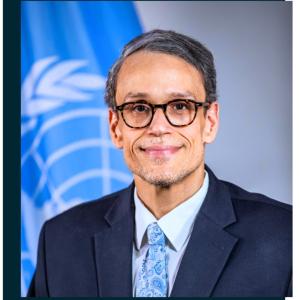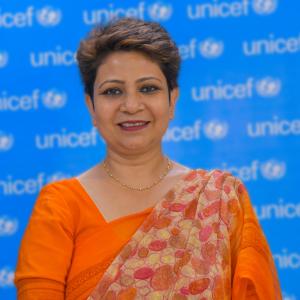From Promise to Progress: A call to Action for All Girls in The Gambia
11 October 2024
IDG 2024
Banjul – 11th October 2024 - The future of The Gambia is not just being written – it is being dreamed, imagined, and shaped by the boundless aspirations of our girls. As we mark the International Day of the Girl, The Gambia stands at a crossroads. While progress has been made in championing girls' rights, a stark reality persists adolescent girls make up 12% of the Gambian population according to the latest data census yet our nation's future hangs in the balance of unfulfilled commitments and unrealized potential.
The Gambia has taken significant strides in promoting and protecting the rights and welfare of girls. We have ratified numerous international conventions on human, child, and women's rights including The United Nations Convention on The Rights of The Child (UNCRC) & Convention on the Elimination of all forms of Discrimination against Women which were domesticated in The Children’s Act of The Gambia 2005 and the Women’s Act 2010, respectively. These global commitments have been translated into national laws and acts, signaling a formal recognition of the importance of girls' empowerment. Yet, there remains a huge challenge in the implementation of these conventions and make it a reality for every girl particularly the most marginalized and vulnerable ones.
Our government's efforts to combat harmful traditional practices like female genital mutilation (FGM) and child marriage have yielded some results. The recent success in preventing the repeal of the law banning FGM is a testament to this progress. However, these victories, while important, are merely the first steps on a long journey.
The stark truth is that implementation and monitoring of our laws remains inadequate. Many girls in The Gambia continue to face barriers to education, with the gross enrollment rate for adolescent girls in senior secondary education stagnating at 65.6%. Issues related to sexual and reproductive health persist, with 20% of girls and women aged 15-49 reporting missed social activities, school, or work due to menstruation.
The COVID-19 pandemic has further exposed and exacerbated these systemic weaknesses. It has laid bare the fragility of our progress and the urgent need for robust, sustainable solutions.
As we reflect on this International Day of the Girl, we must realize the need to do more for the girls of the country. Our vision for the future – one of equality, opportunity, and dignity – remains unfulfilled. The promise we made to our daughters when we signed those international conventions and passed those national laws remains unkept.
The path forward is clear, nonetheless challenging. We must:
- Continue to amplify awareness campaigns to educate both rightsholders and duty bearers about girls' rights.
- Strengthen government systems to ensure effective implementation and monitoring of existing laws.
- Create job opportunities for girls and fund women led entrepreneurship by Investing heavily in girls' education, particularly at the secondary and tertiary levels; as well as equipping them with adequate and appropriate market driven skilling.
- Increase girls’ access to all relevant services including comprehensive sexual and reproductive health.
- Justice systems must be accessible for girls, gender responsive and child centric. Accelerate the justice delivery especially for cases of sexual and gender-based violence.
- Link child protection issues with social protection policies and establish an integrated social protection system that provides socio-economic support to the most marginalized and vulnerable girls and their families including girls with disabilities.
- Investing on capacitating families and communities to ensure an enabling and protective environment where every girl survives and thrives.
- Accelerate multi-sectoral programming and investment to girl-centric, gender transformative programming
The future of The Gambia depends on the empowerment of its girls. Every unfulfilled potential, every silenced voice, every broken promise represents a loss not just for that individual girl, but for our entire nation. We cannot afford to continue this path of half-measures and unfulfilled commitments.
On this International Day of the Girl, let us recommit ourselves to real, measurable action. Let us hold ourselves and our institutions accountable. Let us work tirelessly to create a Gambia where every girl can not only dream big but can turn those dreams into reality.
The future of The Gambia is bright, and girls are at the heart of this promise. By ensuring their rights, unleashing their potential, and amplifying their voices, we pave the way for a more prosperous, equitable, and peaceful nation. Today, and every day, let us stand with girls, and for girls, for in doing so, we stand for a better future for all.
By
Mr. Karl-Frédérick Paul, UN Resident Coordinator in The Gambia
Ms. Nafisa Binte Shafique, UNICEF Representative

Mr. Karl Frédérick Paul
As a seasoned professional, Mr. Paul brings hands-on expertise in leading international organizations with a strong focus on development programming, humanitarian preparedness and response, and social cohesion strategies, all contributing to the attainment of SDGs. His extensive experience spans multiple development sectors, involving collaboration with diverse stakeholders. Possessing robust analytical and conceptual skills, he has always demonstrated a profound understanding of sustainable development dynamics, poverty reduction, and social injustice. A dedicated leader, Mr. Paul brings extensive experience in delivering development programs, conducting policy dialogue and advocacy, fostering long-term equitable partnerships, and leading strategy development on transformative entry points, key transitions, that have essential catalytic and multiplier effects across the SDGs. He advocates that such transitions require a consideration of multiple policy levers spanning economic, social and environmental dimensions.
Furthermore, Mr. Paul is an outspoken feminist and strong advocate for climate action, for green and blue economies. He is a convener of people and connector of ideas that help countries to unlock their potential with confidence at the future. Driven by a results-oriented mindset, he emphatically believes in the transformative power of collaborative action and trust to collaborative and inclusively deliver sustainable solutions contributing to the SDGs.
Mr. Paul has a Master’s in Business Administration, Master’s Degree in Strategic Management from the University of Belgrano in Buenos Aires Argentina and a Bachelor Degree in Finance from Quisqueya University in Port-au-Prince, Haiti. He was accepted for a PhD in International Development at the London School of Economics in 2021. He is fluent in French, English, Portuguese, Spanish, Creole, German and intermediate Arabic. In his free time, Mr. Karl-Frederick Paul enjoys doing crossfit and as a classical pianist, he spends time playing pieces from his preferred classical baroque repertoire.

Ms. Nafisa Binte Shafique
Prior to joining UNICEF The Gambia Country Office on December 01 2023, Ms. Shafique served as UNICEF Chief of Field Office, Bihar, India from December 2020 to November 2023. Before that, she had also served as UNICEF Chief of Field Office, Homs and Hama, Syria from 2016-2018 and UNICEF Deputy Representative in Sudan (2018-2020) and Azerbaijan (2014-2016).
Ms. Shafique has a long experience of working in the humanitarian and development sector. She started her UNICEF career as a national officer in Bangladesh 20 years ago and has since served the organization in different capacities, including as Chief of HIV and AIDS section in Kathmandu, Nepal, Chief of Adolescent Development and Participation in Kathmandu, Nepal, Head of Adolescent HIV Prevention in Lesotho, and Child Protection Officer (Adolescent Development) in Dhaka, Bangladesh.
She has also worked in other organizations, including UNFPA, Expressions Ltd. (a leading social communication agency in Bangladesh), as well as national and international NGOs like Save the Children. Her major areas of expertise are Adolescent Development and Participation, (ADAP), HIV and AIDS, Social and Behavior Change and Gender.
Ms. Shafique is a citizen of Bangladesh and holds a master’s degree in Development Studies from the Institute of Social Studies, The Netherlands, as well as in Social Science from University of Dhaka, Bangladesh.

















